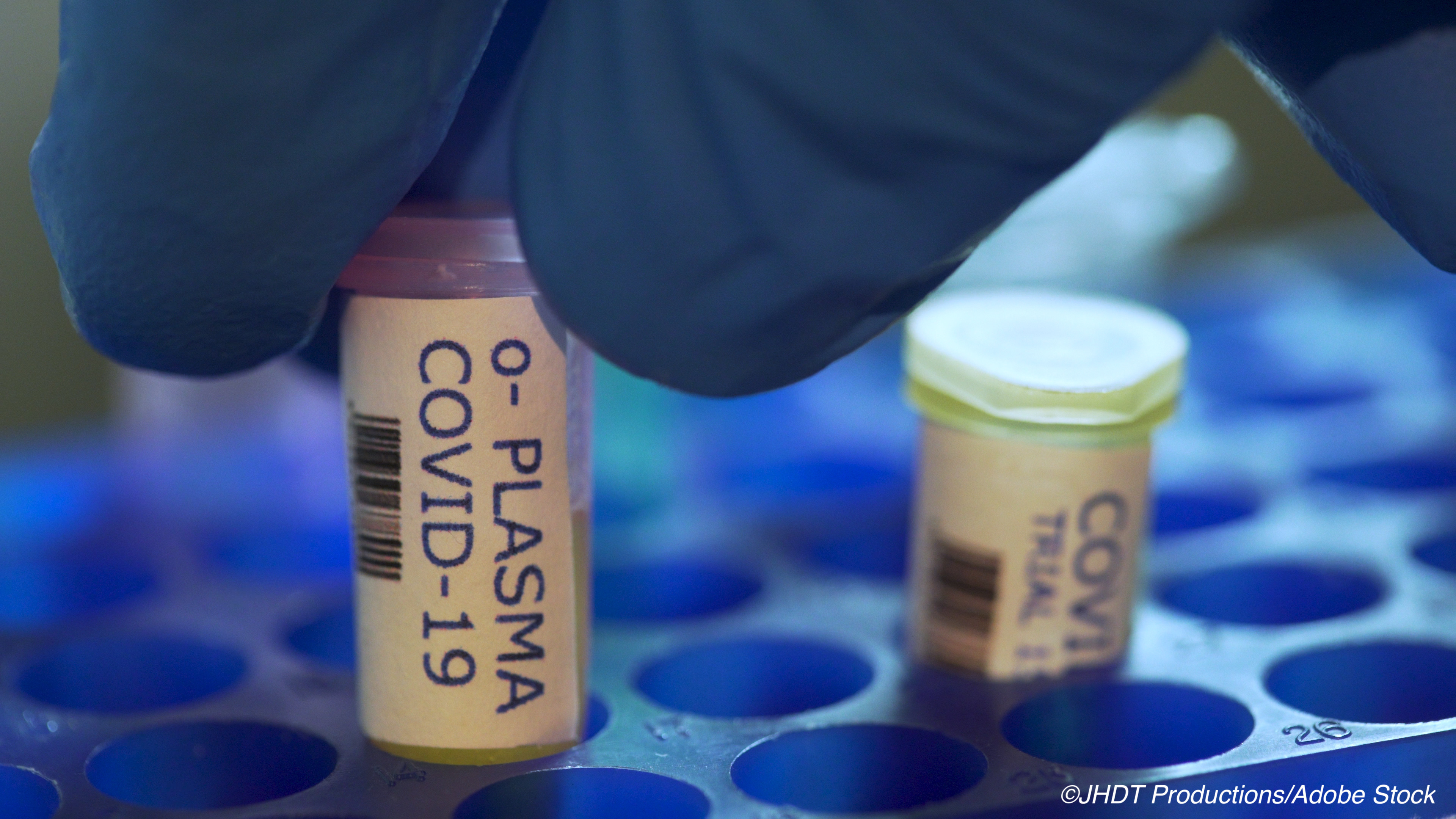Early administration of high-titer convalescent plasma was associated with reduced progression to severe Covid-19 in older adults treated within 72 hours of mild symptom onset in the INFANT-Covid-19 trial.
Among older patients with SARS-CoV-2 infection and recent symptoms onset, treatment with high titer convalescent plasma was associated with a 48% reduction in the risk of progression to severe respiratory disease.
The trial, which was conducted in Argentina from June to Oct. 2020, was stopped early at 76% of projected accrual due to declines in community Covid-19.
While the study lacked the statistical power to confirm differences in long-term outcomes between the plasma and placebo groups, the convalescent plasma group appeared to have better outcomes with respect to all secondary endpoints, including life-threatening respiratory disease, noninvasive or invasive ventilation, and admission to the ICU.
“This simple and inexpensive intervention can reduce demands on the health care system and may save lives,” wrote researcher Romina Libster, MD, MSc, and colleagues from the Fundacion INFANT study group. Their study findings were published online January 6 in New England Journal of Medicine.
The researchers noted that treatments for early stage Covid-19 remain elusive. While convalescent plasma has shown little benefit in the treatment of hospitalized Covid-19 in several recent trials, including the PlasmAr study, a U.S. trial involving more than 35,000 hospitalized Covid-19 patients treated with convalescent plasma showed treatment earlier in the course of disease and administration of high-titer antibodies to be associated with reduced mortality.
In the INFANT-Covid-19 trial, Libster and colleagues examined the effectiveness of convalescent plasma with high SARS-CoV-2 antibody titers, administered within 72 hours after the onset of mild symptoms for preventing progression to severe disease in elderly patients with Covid-19.
The primary study endpoint was progression to severe respiratory disease, defined as a respiratory rate of 30 breaths per minute or more, an oxygen saturation of less than 93% while the patient was breathing ambient air, or both.
Patients recruited for the trial were 75 years of age or older, or between the ages of 65 and 75 with at least one coexisting condition increasing their risk for severe disease, including hypertension, diabetes, obesity, chronic renal failure, cardiovascular disease, or COPD.
Eligible patients had at least one symptom or sign at the time of PCR testing for Covid-19, including temperature of at least 37.5°C, unexplained sweating or chills, dry cough, dyspnea, fatigue, myalgia, anorexia, sore throat, dysgeusia, anosmia, or rhinorrhea.
The interventions consisted of 250 ml of convalescent plasma with an IgG titer greater than 1:1000 against SARS -CoV-2 spike protein or 250 ml of placebo (normal saline) administered less than 72 hours after the onset of symptoms. Infusions were given over a period of 1.5 to 2.0 hours.
The trial was initiated during a Covid-19 outbreak in Buenos Aires, but cases quickly declined. After enrollment of 76% of the target population, the researchers determined that it would take around 5 months to reach their enrollment goal and that “it would be logistically impossible and ethically questionable, given the daily cost of the pandemic in lives and illness, to continue the trial.” Recruitment was stopped and the results were examined.
A total of 160 patients underwent randomization, and in the intention-to-treat population, severe respiratory disease developed in 13 of 80 patients (16%) treated with convalescent plasma and in 25 of 80 patients (31%) in the placebo group (relative risk, 0.52; 95% CI, 0.29-0.94; P=0.03), with a relative risk reduction of 48%.
When the analysis excluded 6 patients who had a primary end-point event before treatment, the effect size was larger (relative risk, 0.40; 95% CI, 0.20-0.81).
The researchers noted that several other studies have shown convalescent plasma to have greater efficacy when given earlier in the course of Covid-19. In one study involving hospitalized patients, those treated within 72 hours of admission had reduced mortality, compared to those given transfusions later. A multicenter study conducted in the U.S. showed lower mortality at 7 days among hospitalized patients who received transfusions within 72 hours of diagnosis.
Libster and colleagues noted that rapid access to convalescent plasma and its low per-patient cost make it a “potentially inexpensive alternative to monoclonal antibodies.”
The trial showed a dose-dependent IgG effect, with infusion of plasma with IgG titers of 1:3200 or higher associated with a 73% reduction in the risk for progression to severe respiratory disease.
“Super donors with IgG titers of 1:12,800 or higher and perhaps immunized persons in the future could contribute to build a therapeutic arsenal,” they wrote. “Among the plasma donors in our trial, 71% of those with titers of 1:3200 or higher had been hospitalized. Since high IgG titers can be maintained for several months, hospitalized patients with high titers should be identified for future plasma donations.”
- Early administration of high-titer convalescent plasma was associated with reduced progression to severe Covid-19 in older adults treated within 72 hours of mild symptom onset.
- Treatment with high titer convalescent plasma was associated with a 48% reduction in the risk of progression to severe respiratory disease.
Salynn Boyles, Contributing Writer, BreakingMED™
This research was funded by the Bill and Melinda Gates Foundation and the Fundacion INFANT Pandemic Fund.
Lead author Romina Libster and principal researcher Gonzalo Perez Mac reported other work from Pfizer, outside the submitted work.
Cat ID: 190
Topic ID: 79,190,254,930,282,494,931,791,932,730,933,190,926,192,927,151,928,925,934



